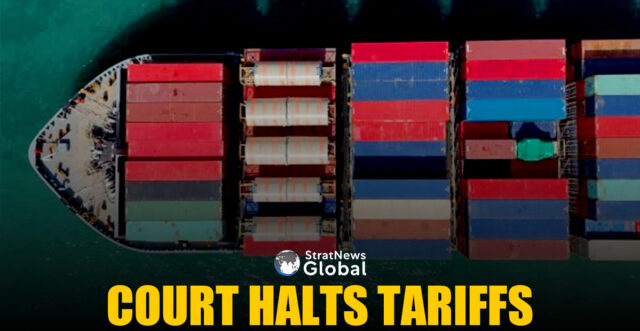A U.S. trade court issued a major ruling on Wednesday, blocking the implementation of most tariffs introduced by President Donald Trump. The court concluded that the president exceeded his legal authority by applying import duties on goods from U.S. trading partners.
The Court of International Trade said the U.S. Constitution gives Congress exclusive authority to regulate commerce with other countries that is not overridden by the president’s emergency powers to safeguard the U.S. economy.
“The court does not pass upon the wisdom or likely effectiveness of the President’s use of tariffs as leverage,” a three-judge panel said in the decision to issue a permanent injunction on the blanket tariff orders issued by Trump since January. “That use is impermissible not because it is unwise or ineffective, but because [federal law] does not allow it.”
The judges also ordered the Trump administration to issue new orders reflecting the permanent injunction within 10 days. The Trump administration minutes later filed a notice of appeal and questioned the authority of the court.
The court invalidated with immediate effect all of Trump’s orders on tariffs since January that were rooted in the International Emergency Economic Powers Act (IEEPA), a law meant to address “unusual and extraordinary” threats during a national emergency.
The court was not asked to address some industry-specific tariffs Trump has issued on automobiles, steel and aluminum, using a different statute.
Trade Turmoil
Trump has made charging U.S. importers tariffs on goods from foreign countries the central policy of his ongoing trade wars, which have severely disrupted global trade flows and roiled financial markets.
A White House spokesperson on Wednesday said U.S. trade deficits with other countries constituted “a national emergency that has decimated American communities, left our workers behind, and weakened our defence industrial base – facts that the court did not dispute.”
“It is not for unelected judges to decide how to properly address a national emergency,” Kush Desai, the spokesperson, said in a statement.
Financial markets cheered the ruling. The U.S. dollar rallied following the court’s order, surging against currencies such as the euro, yen and the Swiss franc in particular. Wall Street futures rose and equities across Asia also rose.
The ruling, if it stands, blows a giant hole through Trump’s strategy to use steep tariffs to wring concessions from trading partners. It creates deep uncertainty around multiple simultaneous negotiations with the European Union, China and many other countries.
Businesses Hurting
The ruling came in a pair of lawsuits, one filed by the nonpartisan Liberty Justice Center on behalf of five small U.S. businesses that import goods from countries targeted by the duties and the other by 12 U.S. states.
The companies, which range from a New York wine and spirits importer to a Virginia-based maker of educational kits and musical instruments, have said the tariffs will hurt their ability to do business.
“There is no question here of narrowly tailored relief; if the challenged Tariff Orders are unlawful as to Plaintiffs they are unlawful as to all,” the judges wrote in their decision.
Oregon Attorney General Dan Rayfield, a Democrat whose office is leading the states’ lawsuit, called Trump’s tariffs unlawful, reckless and economically devastating.
“This ruling reaffirms that our laws matter, and that trade decisions can’t be made on the president’s whim,” Rayfield said in a statement.
In imposing the tariffs in early April, Trump called the trade deficit a national emergency that justified his 10% across-the-board tariff on all imports, with higher rates for countries with which the United States has the largest trade deficits, particularly China.
Many of those country-specific tariffs were paused a week later. The Trump administration on May 12 said it was also temporarily reducing the steepest tariffs on China while working on a longer-term trade deal. Both countries agreed to cut tariffs on each other for at least 90 days.
(With inputs from Reuters)





